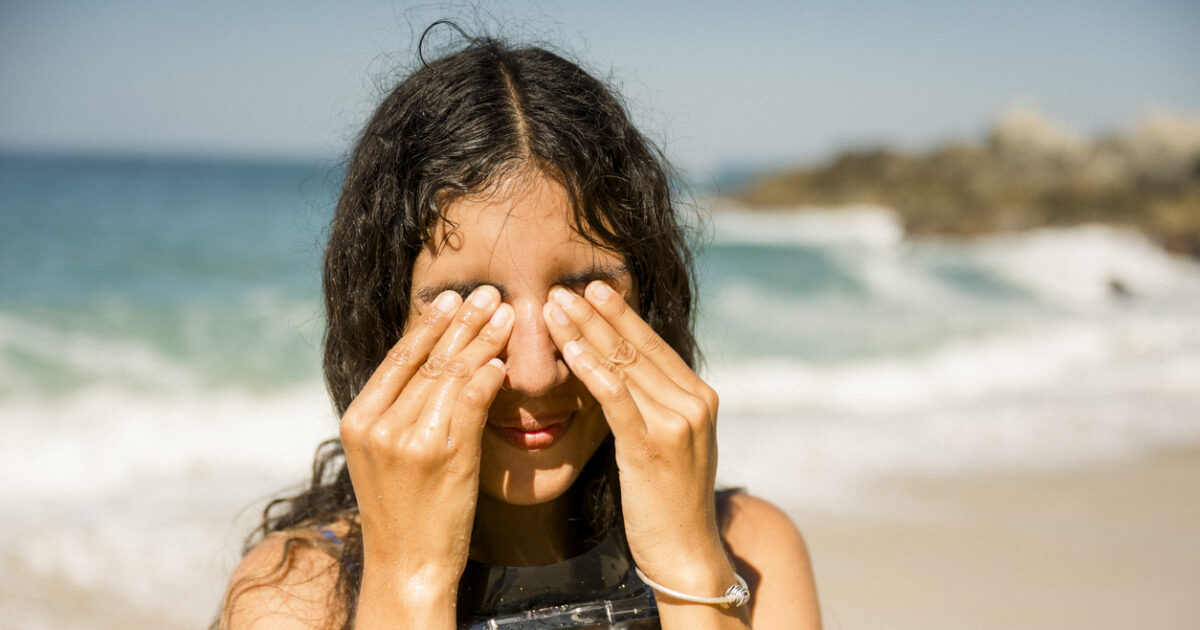Summer is inextricably linked to beach activities that increase the risk of injury to eye. These injuries range from mild to more serious and may be treated with simple measures or needed care by a specialist.
Foreign body entry is probably the most common injury. Sand, dust, water -hovering particles can easily get into the eyes if it blows air or during activities such as swimming.
Injuries from impact (eg with sports equipment such as the ball from the rackets or with another object due to a steep movement) are also frequent.
And then there are eye irritation from contact with sea salt or sunscreen, as well as lesions such as phototeratitis (burn in the cornea of the eye) from the long exposure to the UV (UV) of the sun without good quality sunglasses.
“Possible eye injuries have a variety of forms, each of which has its own level of risk. Some are mild and heal quickly, while others need urgent medical care. The scratches (scratches) in the cornea, eg, are extremely painful and may to be caused even by the sand If the sufferer rubs his eye because he is annoying him. Unless a grain coming into the eye is properly removed, it can cause an eye infection. And injuries from impact can cause bruises to bleeding and fractures in the bones of the ocular conch, “says Dr. Anastasios-i. Kanellopoulos, MD, Surgeon-Ophthalmologist, Founder and Scientific Director of the Institute of Ophthalmology Laservision, Professor of Ophthalmology at the University of New York.
So what should we do if there is any unexpected with our eyes on the beach? Mr Kanellopoulos explains what first aid is for the most frequent eye injuries.
If a foreign body gets into your eye (eg sand, dust, rubbish, etc.): Avoid rubbing your eye so as not to scratch the cornea on the surface of the eye and aggravate the condition. Also not try to remove what is bothering you. What you need to do is sometimes open your eyes (tears are often enough to remove foreign body).
If this does not perform, gently rinse your eye with plenty of saline (you may need 15-20 minutes). If you do not access it, rinse them with clean, lukewarm water (drinking from the fountain or bottled).
If you still find no relief, contact your ophthalmologist.
If you get into your eye smoke from cigarette (conventional or electronic): Do not touch your eye, do not rub it and do not try to remove the contact lens if you wear. Rinse your eye with plenty of saline (or cool, pure tap water or bottled). Also open your eyes sometimes and you will make you feel better.
If pain and discomfort do not retreat, seek medical advice immediately.
If your eyes are exposed to seawater or sunscreen: Rinse your eyes with plenty of saline (or pure drinking water) for 15-20 minutes and blame several times. This may sound paradoxical when the irritation is caused by salt in seawater, because the normal serum also contains salt (sodium chloride). However, its content is low (below 1%) µ while seawater is almost four times.
If you wear contact lenses, you should remove them as soon as you rinse your eyes.
If half an hour later you still feel your eyes irritated, consult your ophthalmologist.
If you beat in the eye with a ball (eg while playing rackets): Avoid rubbing your eyes. Use a cold patch (cold compress) to reduce edema (swelling) and ink. But don’t push it on the eye, just touch it on it.
If the injury is accompanied by an open wound (eg, scratch), do not rinse your eye with tap water. It is preferable to rinse it with saline.
Even if the injury looks small, consult your ophthalmologist.
Keep in mind for any severe symptoms, such as vision changes, persistent pain or any change in eye appearance. If you present any of them, contact your ophthalmologist again, without delay.
If you have sudden symptoms of burn in the eye (photoceratitis): Photoceratitis usually manifests in both eyes, with pain, redness (eyes and eyelids), reduced vision, intense tears, feeling that it has been sanded, swelling of the eyelids and/or highly sensitive to light. If you develop such symptoms, do not rub your eyes. Leave immediately from the sun and go indoors, dark space, without any further exposure to UV radiation.
Rest with closed eyes by placing a cold patch over your closed eyelids. It usually takes 24 to 72 hours to retreat the symptoms, as long as there is no other exposure to UV. You may need artificial tears and a painkiller pill.
Even if your symptoms are mild, consult your ophthalmologist. You may need local antibiotic treatment (eg with drops).
If you usually wear contact lenses, avoid them until your symptoms are completely retreated.
“Eye injuries to the beach are frequent, but their prevention is easy. Always wear good quality sunglasses on dry and protective sports glasses in the water, especially if you make macro. Also be extremely careful now in August that the meltemia begin, because they can easily extrude sand, dust or even cigarette smoke in your eyes. Finally, make sure you are well hydrated so that your eyes produce plenty of tears, which create a protective layer on them, “concludes Mr. Kanellopoulos.
